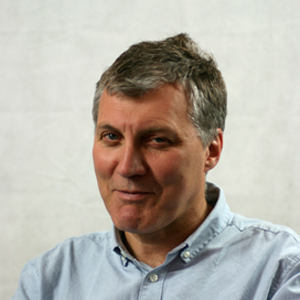Making cities tick
In this profile, first featured in Society Now and reproduced here, Arild Foss talks to Professor Michael Keith about the ESRC Urban Transformations network and his work on how cities function, how different interventions can improve life in cities and why cities are now and will increasingly be vital to how we transform society. An accompanying video interview is also available.

Professor Michael Keith is passionate about cities. “The challenges of the 21st century are in reality the challenges of the city, and they will largely be realised through the city. We’ll see the challenges of an ageing society, of climate change, and the massive opportunities and challenges of rapid technological change. Those three drivers will transform society, but they will do it through cities,” he says.
The demographics suggest he might be right. Since 1950 there has been a huge increase in the percentage of population living within cities across the world, and the trend is only going upwards. For instance, the percentage of China’s population living in cities rose from 13% to 40.4% between the years 1950-2005, and is predicted to rise to 60.3% by 2030. In the UK the percentage was already at 79% in 1950, and is set to rise further to 92.2% by 2030.
“In the UK, the new technologies and innovations of advanced urban services offer the chance to retrofit the ways cities organise social and economic life, but the emergent city will include some and exclude others. Productivity, economic growth and behavioural change structure and are in turn structured by the DNA of the way cities work,” Professor Keith predicts.
As well as being Director of the Oxford-based Centre on Migration, Policy and Society (COMPAS) he is coordinator for the ESRC Urban Transformations network, overseeing over 80 research projects exploring the challenges and opportunities of the new ‘age of the cities’. The first phase of the programme is winding down having provided much needed research evidence on how the rise of cities will impact on us all although an urban focus remains a priority in key global and Newton funding programmes associated with Urban Transformations.
All of the projects are based on interdisciplinary research – encouraging researchers from across different academic disciplines to work together. Similarly, the projects aim to cut across the traditional professional divisions in city management and service provision.
Understanding what makes cities tick is a key part. A great aid for this understanding is the emergence of big data and the ability to track the activities of millions of city dwellers, opening up for groundbreaking insights into how they live their lives.
“Cities are not just systems, they’re really systems of systems – the health system, the economic system, the transport system. Cities are complex systems, and in order to understand them we need to understand the historical legacies that shaped them,” adds Keith.

In research terms these legacies are ‘path dependencies’ and ‘lock-ins’ – the historical context that has shaped a city’s development into its current form, and defines the options for the future. For instance, cities that have been designed for cars are more difficult to make accessible for walking. Cities that have been structured by one economic wave, such as shipbuilding, coal mining or industrial manufacture, will have the infrastructure, facilities and culture reflecting that history, and these path dependencies will frame and lock in the possibilities for the future. Key Urban Transformations projects consider the ways that social innovation and new structures of governance address these contexts, and how the lessons learnt from urban transformation globally lead to new insights that crosses cities, activists, public sector interests and third sector collaborations internationally.
“We need to think about the ways that different forms of interventions change city form as well as city life. What kinds of newly emergent economy, what kinds of newly emergent social life can be possible given the path dependencies and lock-ins of individual cities?”
The Urban Transformation network encompasses research projects working not only within a UK context, but also across a European and global scale. Research on cities has traditionally focused on western societies, but South Asian countries including China and India experience rapid urbanisation, and over the next three decades African cities will grow most of all.
“Cities are always on the move, always mutating – their form changes, their economy changes, their demography changes,” Professor Keith points out. “Sometimes those transformations are beneficial, sometimes not. Urban Transformations is about trying to understand the DNA, the processes, the possibilities of cities; but also trying to think through the sorts of interventions that might steer cities in a more beneficial way than others.”

One obvious area to explore is sustainability and ‘green cities’. Although swelling populations and megacities might conjure up Blade Runner-type visions of polluted cityscapes, studies covering four continents have shown that city dwellers have smaller carbon footprints than their countries’ national averages. Compact living with denser housing, greater use of public transport and more effective infrastructure can give cities an edge when it comes to sustainability.
“Some cities have thought inventively about sustainability. Conventionally, people might think in silos that separate out transport policy from economics, from health policy. In reality you can only understand those things happening simultaneously in a place. When considering transport systems you need to think about how health systems work. If you want more people to walk than to drive, you need to think about the design of cities as well as about what people are eating and how they’re living their lives. All of these things interact.”
With the help of Urban Transformations research we have gained a better understanding of why some interventions work and others don’t – and why some cities progress when others struggle.
“In the UK, although the rank order by size of the largest cities have remained pretty much the same, at a medium and smaller scale you see a significant difference between those cities that have turned their fortunes around over the last 20-30 years and those that haven’t. Some that have gone through forms of restructuring, others that have grown very rapidly, and some that have shrunk,” says Professor Keith.
But in all the focus on city economy we need to keep a focus on the people who actually live there, he emphasises. “One of the main challenges is to explore how cities succeed, finding the optimal mix of factors for economic development. But linked to that there are also other issues that are equally important to the social sciences – issues of social justice, of inclusion of people across the whole of the city, or the exclusion of some at the cost of others.”